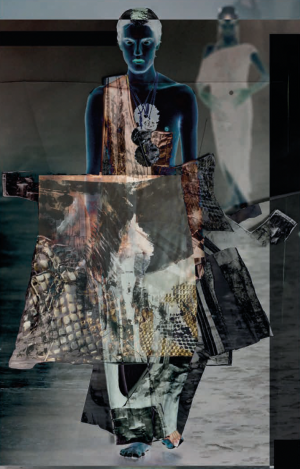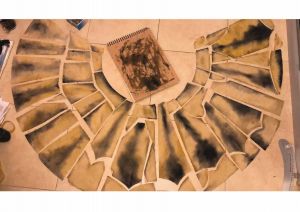A VIRTUAL AINU FISHSKIN WORKSHOP
Fashion is a global industry. The problems of the world are the problems of fashion, in cause and effect. These environmental, social and economic challenges, very real to the fashion world, are only microcosms to their global equivalents. The growing environmental crisis calls urgently for action. The Covid-19 pandemic presented an immediate crisis, necessitating rapid and radical change. While bringing new problems in its wake, it demonstrated our ability to adapt, rapidly. Now we need to match this reactivity to the global environmental crisis. Because the issues and implications are global (literally), there is no single solution - rather a series of endeavours contributing to overall amelioration.
For the last four years, under my Fulbright scholarship, I have been privileged to travel within the Arctic, researching fish skin craft. Learning from the Arctic Indigenous communities, I have supplemented this education with the knowledge of the museum curators and a study of their artefacts, worldwide, and added to it the expertise of artisanal and industrial tanners. In my role as BA Fashion Print lecturer at Central Saint Martins I have shared the sum of this knowledge with my students and learned again from them in the process. They, in their turn, have been keen to disseminate this knowledge further amongst their friends and classmates and - as they become professionals - within the fashion industry. It has been a truly global project. I created a series of fish skin craft workshops, in situ, bringing fashion students from Nordic, Chinese, Japanese and American backgrounds to the specific Indigenous communities with historical evidence of fish skin production to learn from them and from each other. When the Covid pandemic rendered travel impossible, I made these workshops virtual. One such, we submit here for your consideration.
Together with Orit Freilich (senior fashion lecturer at Shenkar College of Engineering Design & Art), we established the project as part of the EU Horizon 2020 funded project FishSkin, 'Developing fish leather as a sustainable alternative within the fashion industry'. We took the opportunity of the Covid lockdown to mentor jointly a third-year student on the Shenkar F4*3D course. This course focuses on workwear apparel and utilitarianism. Students choose a working garment dating back to the 19th century and make an exact replica, based on the original patterns in archival photographs, developing a conceptual and practical design process adaptable to modern industrial needs. The student chose to reproduce a 19th century Ainu hunter coat made of fish skin.
Our concerns were as much pastoral as academic. We wanted not only to impart knowledge to the student - all the information of the coat coming from the photographs I had taken when I viewed it in Hokkaido - but also to keep him inspired and connected during a period when students were suffering from the lack of classroom interaction that accompanies remote learning. This online platform provided excitement, connection, a new fish skin craft expertise and the opportunity to engage with remote Ainu knowledge, as well as with museum artefacts, bringing an awareness of ancient traditions and industrial concerns. Both Central St Martins and Shenkar maintain an approach to fashion education based in the development of manual skills. The student, confined at home with limited materials and technologies, was prompted through reflection on overconsumption and waste and the scarcity that follows, to reconsider, recuperate and upcycle.
Such a workshop, in this digital age, can make new and sustainable connections between the virtual world and traditional craft. It can bring a spiritual understanding to the practical. It has allowed students and tutors from different backgrounds and nationalities to come closer despite physical distance and pandemic lockdown, forging life-enhancing connection in a time of isolation. This online fish skin workshop has been a new form of communication and learning when classrooms, museums and libraries were closed. Ancient fish skin craft provides a 'new' practice for alternative, sustainable production, and thus, an option for more conscientious customers in a post pandemic lifestyle seeking a new fashion supply with slow growth and circular economy. An ancient and endangered artisanal craft, it presents resources for innovation and technical development from small to larger scale solution. How can this slow, hand crafted, locally made fashion process be industrialised/grow while retaining its artisanal virtues? These are the issues of local experience and inspiration against international needs and demands, of local history and heritage as a source of creative fashion solutions, of craft and fashion-making in a global world.
The Covid pandemic has bought new urgency to the evolution of man's relationship with nature. The crisis has bought a shift in perception of nature and the role of humanity within it, as keeper, rather than despoiler. Ainu Indigenous Peoples have much to teach us in this respect, and now is surely a time to make them heard, and to listen.
https://www.youtube.com/watch?v=tyuR2BkM8QM
- DALL'ALTA MODA ALLA MODA ARTICA
- THE DEEP DIG UPENN MUSEUM
- MAPPING RACE THROUGH ARCTIC FISH SKIN ARTEFACTS
- ADORNMENTS FROM THE SEA
- AMUR RIVER FISH SKIN NATURAL DYES
- ARCTIC INUKSUIT STONES
- SPIRIT AND SKIN
- ART BIO MATTERS
- NORDIC FISH LEATHER DAY
- ARCTIC PRESERVATION & DIGITAL AGE
- INDIGENOUS KNOWLEDGE
- TRADITIONAL DYES FOR FISH LEATHER
- ICOM ICME 2023 FISH SKIN COLLECTIONS
- FISH WASTE FOR PROFIT
- FISHSKIN PATTERN-BASED GARMENTS
- A VIRTUAL AINU FISHSKIN WORKSHOP
- ARCTIC INDIGENOUS FISHSKIN
- SOCIETY OF LEATHER TECHNOLOGISTS
- COSTUME SOCIETY OF AMERICA
- IFFTI CONFERENCE 2020
- DESIGN MUSEUM CONFERENCE LONDON
- KYOTO SEIKA UNIVERSITY
- CRAFT CONFERENCE ESTONIA
- CUMULUS ROVANIEMI 2019
- MILANO DESIGN WEEK
- SIMON FRASER UNIVERSITY VANCOUVER
- BRITISH COUNCIL CRAFTING FUTURES
- EU INDUSTRY DAYS BRUSSELS
- LINEAPELLE INNOVATION TALKS
- EUROPEAN LEAGUE OF THE INSTITUTES OF THE ARTS
- DWEEK BILBAO AND BRITISH COUNCIL
- BRITISH ASSOCIATION FOR JAPANESE STUDIES
- TRANSBOUNDARY FASHION SEMINAR



